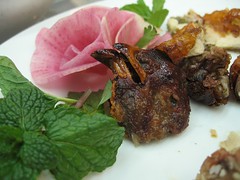- “Beginning in the late 1990s, Kock travelled throughout Ontario collecting twigs of seemingly healthy mature elms, in what amounted to an elm dating service.”
- “…a curated inventory of miscellaneous interestingness” lands on the Millennium Seed Bank. Hilarity ensues.
- What do hopscotch, architecture and maize have in common?
- Zebras good for cattle.
- The fig deconstructed.
- “Improve yields through crop diversity…” ??? Who are these people?
- Crops for the Future bemoans the loss of “a spineless variety of Solanum quitoense.” Someone, somewhere must still have it, surely.
- Mangos: Haiti’s new best friend?
- Home-bred eggplants. Or aubergines.
- “Urban agriculture in Japan, cultivating sustainability and well being.” Again? Still?
- West Africa to get bunch of specialist biotechnology centres for crop improvement. No word on where the existing national genebanks fit in. Nor, ahem, what role IITA, ICRISAT and the other CGIAR Centres are going to play in all this.
Nibbles: Baobab, Plant cuttings & carnivalia, Apples, Fodder, Range management, PNG blog, Cattle breeding, Food security questions
- Baobab: your favourite nutritious neglected species for the next 10 seconds.
- Nigel Chaffey’s fresh selection of Plant Cuttings is up.
- Which reminds me; don’t forget to submit to Berry go Round.
- Searching for lost apples in the Scottish Highlands. A job for mountain rescue?
- Why feed my cow? A more interesting question than it seems.
- Rangeland scientists take photos of their study sites shock. Applications for crop wild relatives? Bound to be.
- Glad to give my friend Seniorl Anzu at NARI in PNG a plug for his new(ish) blog, PNG-Agrinews.
- Wageningen solves that cow burping problem.
- Cambridge says I see your cow burps and raise you food security.
Nibbles: Polyculture, Melons, Cheese 2011, Australian medicinals
- Do polycultures have a role in modern agriculture? Well, do they? h/t The Scientist Gardener.
- Texas breeders go for better melons.
- “Children from the city who try this yogurt don’t like it, but they’re not healthy like my children!”
- Hotspots for Aboriginal traditional medicinal plants mapped to within an inch of their lives, thanks to GBIF.
Do count your chickens …
… and feed them, and tuck them up at night
 Regarding those kuroiler chickens, one of the things I’m pretty sure we discussed eruditely and at length was my firm recollection that a little bit of tender loving care would do more for chicken productivity than shiny new breeds, at least for poor village households. Turns out I wasn’t misremembering. A quick search turned up quite a few extra instances of research that makes that very point.
Regarding those kuroiler chickens, one of the things I’m pretty sure we discussed eruditely and at length was my firm recollection that a little bit of tender loving care would do more for chicken productivity than shiny new breeds, at least for poor village households. Turns out I wasn’t misremembering. A quick search turned up quite a few extra instances of research that makes that very point.
An FAO paper from 1997 points out:
In view of lessons from the past rural poultry improvement programmes, a new approach should aim at increasing flock productivity instead of individual animal productivity. The potential of the village chicken as a provider of food and income should be exploited. A combined approach is suggested, which must be accompanied by improved extension services and farmer training on good husbandry practices, namely: housing, hygiene, feeding and health control. Improvement techniques should be based on indigenous technologies and available local resources.
There’s more sound advice in a factsheet from FAO, which stresses the benefits to be gained by taking better care of young chicks and improving housing for the whole flock. Makes sense; if something else has eaten your birds, you’re not going to be able to.
An entire PhD thesis looks at Improvement of village chicken production in a mixed (chicken-ram) farming system in Burkina Faso. Of course I haven’t read it, but I did filch this from the abstract:
System analyses showed that both village chicken and sheep fattening could be used for improvement of livestock production and subsequent income generation at rural farm level. Furthermore, an integrated village chicken and ram-fattening farming system appeared to be a promising possibility for village chicken improvement. It allows to control village chicken scavenging and to reduce the high risks related to the free-range system. The studies demonstrated that regular supplementation with locally available feedstuffs as sorghum or local beer by-product can be used as feeding strategies to improve village chicken production.
The Poultry Hub links to a few other studies.
The point is that while new breeds are fine and dandy, especially for the intensive, commercial sector, villagers who keep chickens need information, knowledge and training, not shiny new breeds. And that requires extension services, and even if those don’t always work too effectively, we do know how to improve them.
Chickens represent one of the best options to improve the livelihoods of poor rural families, but bringing that promise home to roost requires plodding, unglamorous extension work, and that’s just not a priority any more.
Nibbles: Nigerian farmer speaks, Kenya meeting, Ecuador, Striga-resistant sorghum, Designer veg, Cottontail, Funding conservation, African adaptation
- Why one Nigerian agriculture student will not become a farmer.
- Meeting in Kenya on agricultural biodiversity, and other stuff, in October.
- Ecuador and access to genetic resources (in Spanish).
- “Scientists on the verge of releasing new striga-resistant sorghum.” Drought-resistant too! No need for push-pull then?
- One wacky plant breeder’s story.
- Attractive local bunny in trouble. Not what you’re thinking, get your mind out of the gutter.
- Forest bonds in the offing. Genebank bonds, anyone?
- Climate change adaptation in Africa: examples of genetic and agronomic fixes. Need both, I guess.